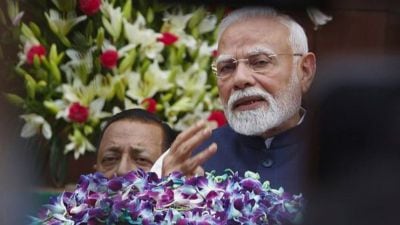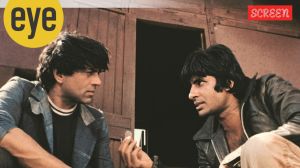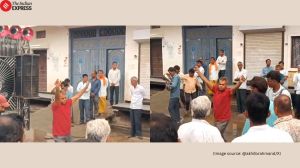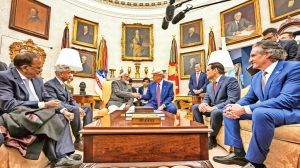Click here to follow Screen Digital on YouTube and stay updated with the latest from the world of cinema.
Zoya Akhtar on censorship: ‘You can see women being beaten and sexually assaulted, but you can’t see a kiss?’
At the third session of Expresso, Zoya Akhtar talked about censorship in our films, the importance of showcasing physical intimacy, and how the line should be drawn by the filmmakers themselves.
 Zoya Akhtar on Angry Young Men documentary.
Zoya Akhtar on Angry Young Men documentary. Lyricist-screenwriter Javed Akhtar and his filmmaker daughter Zoya Akhtar graced the latest session of Expresso held on Thursday in Mumbai. Talking about their love for literature, for cinema, and of course, each other, the charismatic duo impressed the audience with their conversation peppered with unadulterated laughs, poignant smiles, measured pauses, and a wonderful sense of bonding.
During the session, Zoya, who recently helmed the Archies adaptation for Netflix, and backed the coming-of-age drama, Kho Gaye Hum Kahaan, once again on Netflix, opened up about the lack of censorship on OTT, and if this is limiting or liberating her as a filmmaker. Dismissing the argument that sublimation makes better art than explicitness, Zoya said there needs to be a nuanced approach when it comes to physical intimacy. “It is very important to showcase consensual intimacy on screen. I grew up at a time where women were bullied, beaten up, harassed and sexually assaulted on screen. All these were allowed, but you couldn’t see a kiss. People should be allowed to see love, tenderness, physical intimacy between two adults,” said Zoya, who received a warm round of applause from the live audience.
But then, the absence of censorship can also result in a no-holds-barred approach to showcasing intimacy on screen. Understanding this line of argument, Zoya Akhtar reiterated that it all comes down to the artistic choice of a filmmaker. “Every film has a tone, and every filmmaker tells a story in a particular way. As opposed to Ramesh Sippy’s Sholay, where the choices of showcasing violence were ahead of its time, the violence in Tarantino’s films are operatic. It is all about what you are trying to evoke in the audience,” said Zoya, who juxtaposed the artistic freedom argument to the way each region showcases sexual intimacy. “The French are more open with male nudity when compared with the Americans. Their relationship with their bodies is different. It is a very cultural thing, and it depends on how comfortable you are with yourself, how you view sex, how you view your body, etc… I wouldn’t do in Zindagi Na Milegi Dobara what I did in Lust stories. The audience doesn’t make a big deal of it because the intentions were clear,” said Zoya, whose response was seconded by her illustrious father.
Adding to Zoya’s points, the legendary writer said, “If you are showing a love scene to titillate, that is different. If you want to evoke some genuine romance, and empathetic emotions, then it is different.” Comparing the vocabulary of his daily life to the ones he sees on screen, he said, “Even in my worst anger, I don’t use four-letter cuss words. But when I saw it being uttered on screen in Bandit Queen, I didn’t mind them because the intention wasn’t to shock or titillate you. Many films say they are depicting the lived realities of sections of the society and use these words. However, it is clear that except the language, nothing reflects their lived reality. Now, that is crude. Intention is very important.”
Photos



- 01
- 02
- 03
- 04
- 05






























